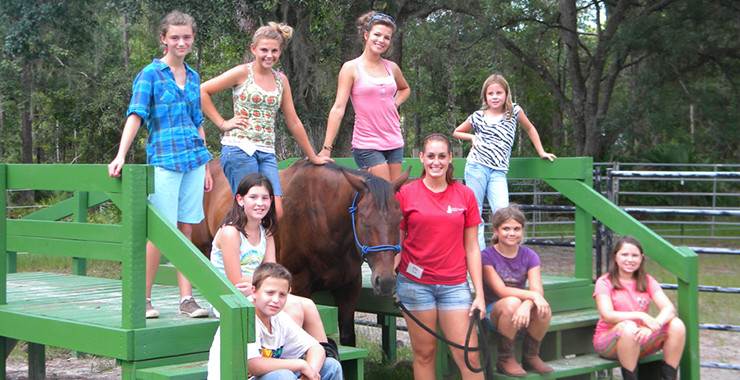
Haven Horse Ranch: St. Augustine, FL
Lovelane Special Needs Horseback Riding: Lincoln, MA
It was an average day on Haven Horse Ranch in St. Augustine, Florida, when a group of children with physical disabilities arrived for their lessons. That wasn’t unusual, according to Ric Lehman, owner of the ranch. Groups came from time to time. Lehman relished the joy in kids’ eyes when they experienced the freedom of riding a horse for the first time. What came next was unusual, though.
One of the girls in the group was catatonic—and had been since she was born 14 years earlier. She had never made a sound—no laughter, no words, no cries of anguish.
On this particular day, she mounted the horse and sat. One minute passed. Two minutes. Finally, three. Perhaps this won’t work, thought her counselors. And then they heard it: A cooing noise. A sound of joy. This 14 year-old was showing emotion for the first time in her life.
“Her counselors sobbed like babies,” recalled Lehman. “That was the day I knew there was something to this.”
People who run equine-assisted activities and therapies (EAAT) report similarly amazing outcomes for kids and adults living with a host of challenges, which is why The MENTOR Network Charitable Foundation continues to take a special interest in supporting them. In addition to Haven Horse Ranch, past Community Partners include Lovelane Special Needs Horseback Riding in Lincoln, Massachusetts.
Lovelane serves 110 kids from the ages of 18 months through 24 years-old who are living with a wide range of challenges including autism, Cerebral Palsy, genetic disorders, Down Syndrome, and developmental delays. They also serve kids battling cancer and other life-threatening diseases.
Activities are customized depending on each rider’s individual therapeutic goals, whether it’s to improve trunk strength, speech, cognition, motor skills or social skills.
“At Lovelane, these children find a place where they can succeed as athletes and enjoy a freedom of movement they might otherwise be denied,” said Debby Sabin, Lovelane’s founder and executive director. “They feel proud when they trot for the first time, are able to steer a horse around cones or ride in the woods on our therapy trail.”
Such positive outcomes motivated Lehman to transform his business into a nonprofit in the late 1990s. He made another bold move last year: Haven Horse Ranch offers all equine therapy for free.
“There are too many kids who need us,” said Lehman.
In 2010, his goal was to complete 1,150 hours of therapy. He and his three paid staff members exceeded that by 820 hours for a total of 1,977. These numbers don’t include the prep work that goes into each session, which averages two and a half hours per rider. Regardless, each year he sets the goal even higher.
With his staff dragging under the strain, Lehman is focused on growing the organization and raising his $200,000 annual budget from foundations and individuals.
Like Haven Horse Ranch, economic hardship is never a barrier at Lovelane. Forty to forty-five percent of their riders receive tuition assistance. They have a waiting list of 200 young people.
Lovelane’s heated indoor ring, outdoor ring and skill-building riding trails give kids the chance to receive their 30-minute weekly instruction in any weather. Therapeutic riding instructors are joined by more than 100 volunteers.
Doctors told the family of one Lovelane rider that he would never walk. Today, at age 24, he is upright and mobile. Ask him to say something about himself, and he will offer one thing: “I ride horses.”